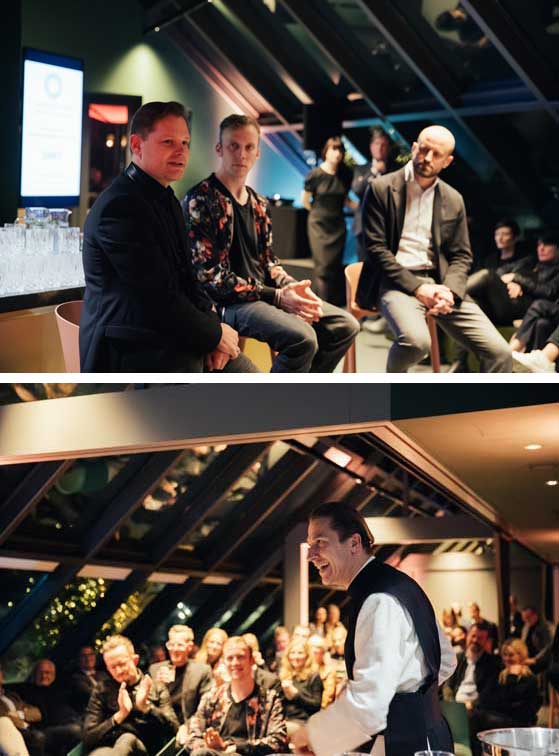The Munich premiere of our established hc privée Talk took place in February 2020 shortly before the outbreak of COVID-19. The topic of “Fast Fashion – Fashion in an Age of Sustainability” brought 50 guests from the worlds of fashion and business together at hartmanns, high over the roofs of our home city, to discuss the contradictions of the fashion industry and society as a whole with a panel of industry experts from H&M and C&A––and a Cistercian priest.
The subsequent discussion confirmed that, regardless of the corona crisis, it is important to clarify the urgent questions of sustainability in the fashion industry.
“We all too easily overlook the fact that in 2019 more SUVs were registered, more flights were taken and more meat was eaten than ever before.”
The scope of the evening’s topic could hardly have been broader, so the wealth of expertise and perspectives assembled at the event was extremely useful. Sustainability, that buzzword from the 2010s, has pervaded every sector, every product and debate and, unfortunately, has often been subjected to knee-jerk overuse. As if we could suddenly raise our level of environmental awareness simply by labeling everything around us “sustainable.”
“We all too easily overlook the fact that in 2019 more SUVs were registered, more flights were taken and more meat was eaten than ever before,” warned presenter Marc Schumacher in his opening speech.
But what does all this have to do with the clothing industry? Much too much, unfortunately; the fashion business is very far from being able to claim the status of ecological role model. Schumacher had the figures at hand: fashion generates 1.2 billion tonnes of greenhouse gas emissions per year, more than aviation and shipping combined, and is responsible for 1/3 of the plastic waste washing around in our oceans and 1/3 of global water consumption.
Nevertheless, many fashion companies are tackling the issue of sustainability with some intensity. Hendrik Heuermann is living proof. The East Frisian native, Sustainability Manager at H&M Germany, was one the speakers at our hc privée talk.
“Many consumers think sustainability is a fine and noble thing, but by no means all of them are willing to engage with it to any great extent.”
Heuermann summed up the dilemma of his role thus: “How can we respond to questions when nobody wants to hear the full answer?” In other words, many consumers think sustainability is a fine and noble thing (a classic case of political correctness, perhaps?), but not all of them are willing to address it in any depth. Partly because of the complexity of the answers to sustainability issues, surmised Martijn van der Zee, Chief Merchandising & Sourcing Officer C&A Europe.
“Sustainability is nice enough to have, but it’s never going to trigger an impulse buy.”
The panel guests agreed unanimously that sustainability is rarely top of the list when purchasing decisions are made. Instead, three other aspects generally take priority: availability, choice, and price. In addition, theologian and economist Justinus Pech expressed his doubts that awareness of sustainability is accompanied by action in the cause of sustainability: “We’ve already known for twenty years that it’s wrong for our beaches to be knee-deep in plastic bottles. So what’s happened? We’ve doubled our plastic consumption between 2000 and 2020.” It seems our innate moral understanding has a blind spot where sustainability is concerned. “Nobody comes into our stores asking to see our organic cotton range,” admits Heuermann. “Sustainability is nice enough to have, but it’s never going to trigger an impulse buy.”
But nothing will happen without a commitment to sustainability. Firstly because, to borrow a term from brand science, sustainability represents a “point of parity,” a hygiene factor offered by (almost) every brand. Secondly, because employer brands have identified sustainability as an important benchmark for courting the attention of Generation Z. And thirdly, because it represents more than “mere” environmental protection. Our panel was confident that it will help to safeguard and secure business models.
“If every country in Europe has its own individual standard in place, sustainability becomes Mission Impossible.”
Sustainability will also be a focus in the technological transformation into automated production. And a key topic according to Heuermann will be “the question of resources–the key issue for the fashion business.” He recalled the day when the first clothing collection bin was installed in a branch of H&M as “one of the best days in my whole career.”. And not only for ecological reasons; Heuermann pointed out that there will be limits to the global availability of land for farming organic cotton. Companies will thus need to focus all the more on recycling raw materials.
Environmental standards are an area where the world of business clashes strongly with the policymakers, as our panel debate showed. They condemned environmental seals of quality like Germany’s new “Green Button” as too short-sighted and ignoring the realities of international production. Our experts agreed that Europe-wide solutions are needed for both entrepreneurs and the environment. And those solutions would need one essential characteristic: sustainability.
//
Save the date:
More insights and expertise will be provided on September 17/18 2020 at our first “SHIFT” Conference. The event is aimed at a proactive community seeking solutions for future-facing topics, and will focus on dialogue and on shaping today and tomorrow.
